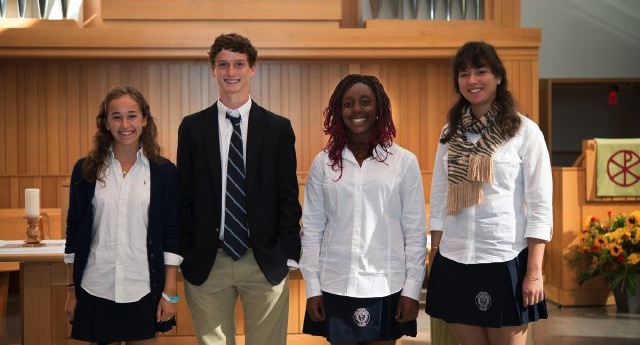
Katie O’Reilly ’14: Episcopal is a community that embodies three traditional values; the mind through rigorous academics, the body through competitive athletics, and the spirit through an active chapel program. However, the academic nature of this institution is the most fundamental component of what makes Episcopal one of the most elite preparatory schools in the nation.
That noted, it is essential that the academic labor of the students be acknowledged in the similar light as we do with the athletic teams and the chapel program. Consequently, the Honors Chapel service in the autumn of a fresh academic year serves as a proper embodiment of the mind element of the Episcopal student.
The entire Upper School student body gathers on a September morning in the Chapel to show respect for their classmates and also gain a sense of motivation from the ceremony itself.
President of Episcopal’s chapter of the Cum Laude Society and a member of the history department, Kris Aldridge noted that the significance of this ceremony not only lays in the recipients but also those who are watching in the audience, “I think it is valuable for the entire Upper School to see what they can strive for. So freshman, sophomores, and juniors can be saying to themselves I want to be a student who is honored on this day.”
Likewise, chapter secretary of Episcopal’s Cum Laude Society and Form Dean of the class of 2014 Sarah Baker ’01 noted: “A lot of the time, we labor in private. To see other students actually going up and receiving these prestigious awards and honors is motivation for students who think they are alone in their efforts.”
Although the freshman, sophomore, and junior classes are up for significantly fewer prizes and honors, it is so valuable for them to sit year after year in this ceremony to respect and learn “That the accomplishments that we are commemorating are truly remarkable” says Baker.
Moreover, students witnessing this ceremony can take into account the significance of each award as Baker added, “What I hope at least is that a student in the crowd can key in on one award and say boy that really resonates with me.” Although the Cum Laude society is awarded to those solely based on academic standing and the challenge of a student’s course load, the service acknowledges the intellectual curiosity, innovative thinking skills, and overall ability of an Episcopal student’s mind. Likewise, Aldridge noted, “You can be curious and enthusiastic about academics without being in all of the AP courses.”
Although sometimes the focus of this ceremony seems too purely academic, in reality there are different components of the book awards that really are very carefully worded that divulge the unique nature of a particular student. As Aldridge further stated: “ There is a component of not just how well you can do on a test but what do you bring to the classroom aside from being super smart, that ultimately makes you stand out.”
The University of Pennsylvania book award for example focuses on not only the scholarship of a student but also someone who really thinks with an innovative mind.
A chapel of this nature incorporates the success of students with a communal understanding of the effort that goes into academic achievement. During this ceremony the department heads and the deans wear academic robes and Baker noted, “You think to yourself why might that be? It is sort of like when a player is injured but still sits dressed on the sidelines. It is an all-in communal understanding of the effort that is takes to be a student.” In addition to an understanding of the effort Baker stated, “These are the academic robes we wore as students and thus we are saying that we are all engaged in the same effort.” That moreover is why it is so important to have the entire Upper School in attendance of this particular ceremony, as Baker noted, “It demonstrates that we are all a part of this academic family.” Selecting the recipients of the book prizewinners is something that the faculty takes with such a serious note to make sure that they are absolutely choosing the right student.
After the previous school year ends there is a faculty meeting for an entire day that is devoted to the selection of who will receive the awards at Honors Chapel. Aldridge mentioned, “We sit as a faculty and debate and parse through the language of each award description.” On top of that, Baker added, “We spend a lot of time researching the students by getting the input from all those who have taught a student and therefore collecting that praise to share with each other so that the person who wins the award is a shining example out of cadre of students who are up for the award.”
Ultimately we are a prestigious institution that lives the motto mind, body, and spirit. We stand for body in our extreme support of our numerous athletics teams. We stand for spirit by having a chapel placed where it is and having the service as such an integral part of our day. Nonetheless Baker concluded: “Then I think the Honor’s Chapel Service is a part of standing for mind. To show that here we are in one of our three capacities recognizing the people who have been the most successful.